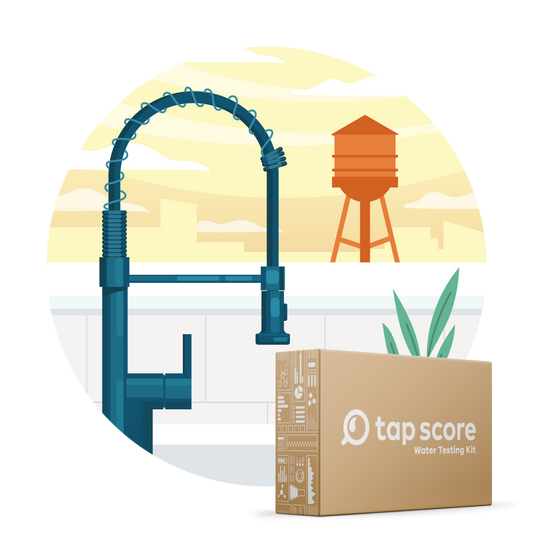
How Do I Performance Test My Berkey?
Our blog is written by real experts— not AI. Each guide is carefully reviewed and updated based on the latest research. Plus, with no affiliate links, you can count on unbiased insights you can trust.
Of the dozens of household water filters making waves on the market today, few are as popular or as well marketed as the Big Berkey Water filter. Despite the online coverage, however, these sleek, two-chamber systems have never been independently certified to NSF/ANSI standards. So how do you know if your Berkey water filter is really effective?
You performance test it. Read on to learn everything you need to know about performance testing your Berkey, including what contaminants to look for and hot tips for optimal testing.
Table of Contents:
- Performance Testing Your Berkey
- Why Should I Performance Test My Berkey?
- What Contaminants Should I Performance Test My Berkey for?
- How to Performance Test Your Berkey
- Why Trust Tap Score?
Performance Testing Your Berkey
Full performance tests are the best way to find out how effective your Berkey really is at removing contaminants.
With proper performance testing, your water is tested before and after it passes through your filter:
- The first test analyzes the quality of your water before filtration—this sample would be taken straight from your tap.
- The second test analyzes the water after it has passed through your Berkey water filter, allowing you to compare your results with the state of your unfiltered water.
This means a total of two (2) identical test kits are required to performance test properly. (Public water system customers; private well owners.)
Are Red Dye Tests Performance Tests?
No, even if you’ve seen videos or read blog posts detailing a Berkey water filter’s performance in red dye tests, or in lowering TDS levels, these are not performance tests and should not be considered a thorough evaluation of Berkey filters.
Why Should I Performance Test My Berkey?
Performance testing helps you understand your particular water needs and how your Berkey fits in with those needs.
Everyone’s water is unique to their environment and their home water system. By presenting you with a baseline assessment of water quality, you’ll be able to understand any potential changes in your Berkey’s performance down the line.
Performance testing is also the best way to verify the type of bold claims common throughout the water treatment industry.
For example, Berkeys claim to remove certain contaminants at an amount greater than “99.9999%.”[1] But can they, really? And for how long? Performance testing your Berkey is a simple way to guarantee your filter is living up to its claims.
Making Up for Missing Certifications
Most importantly, performance testing helps make up for missing certifications.
Despite the popularity of Berkey water filters and the variety of coverage floating around online, Berkeys—specifically their Black Berkey Elements—are not certified to any NSF/ANSI standards. These standards include a rigorous performance testing regiment performed in a laboratory environment.
While a household performance test is not a certification, it is a reliable way to check on the performance of your Black Berkey Elements over time.
NSF/ANSI certifications explained
What Contaminants Should I Performance Test My Berkey for?
We always recommend getting a baseline picture of your water quality so you can determine what your specific contaminant concerns are. Remember, full performance tests require two identical tests, one for your water source, one for your filtered water.
Should I Test My Berkey for Bacteria and Other Pathogens?
You should absolutely test for bacteria if your water comes from a well, a local spring, or harvested rainwater. (Public utilities specifically work to kill microbes by chlorinating water before distributing it.)
-
Bacteria and Filter Maintenance
Berkey claims removal rates of 99.9999% for bacteria and >99.999% for viruses.[1] But filters that remove bacteria or other pathogens do not necessarily kill them, allowing them to remain and possibly proliferate on the filter elements.
If you know for certain your water is suffering from microbial contamination, it’s important to change your filter soon afterward.
For those with large, harvested water supplies, (e.g. rainwater or spring water), it is best to chlorinate your water supply before filtering it. This way, you can avoid promoting microbial growth on your filter, and use it to remove residual chlorine and its impacts on taste and odor.
Identifying and testing for common waterborne pathogens
Should I Test My Berkey for Lead and Other Heavy Metals?
Yes, heavy metals are the number one contaminant to test for, regardless of source. Berkey claims to remove over 99.9% of lead and many other heavy metals (such as copper, mercury, iron and manganese), while leaving in hardness minerals (calcium and magnesium).[1]
A test should include information on both.
Should I Test My Berkey for Nitrates?
Nitrates are an important contaminant to test for, regardless of your water supply. Berkey water filters do not reduce nitrates. While commonly associated with agriculture, nitrates can make their way into any water supply and have been linked with health issues, particularly for infants.[2]
If nitrates are present in your water supply, a Berkey might not be the right fit for you.
Should I Test My Berkey for Microplastics?
Berkey claims to be effective for the removal of particles in the "24 to 26 nanometer range" (Microplastics at 2.5 microns = 2500 nanometers). But, as mentioned, they haven't been certified by NSF, WQA or IAPMO. While activated carbon treatment is currently considered an effective removal treatment for certain microplastics, you may want to know more about the types and sizes of microplastics in your water.
Learn more about microplastics
Should I Test My Berkey for PFAS?
Berkey claims to remove 99.9% of nine types of PFAS (including PFOS and PFOA). While activated carbon treatment is currently the most studied effective removal treatment for PFAS you may want to know more about your specific PFAS levels.[3]
Learn more about testing for PFAS
Should I Test My Berkey for Pesticides, VOCs, or Other Industrial Contaminants?
Berkeys claim to remove 99.9% of VOCs, pesticides and herbicides—including glyphosate, a widely used herbicide in industrial agriculture operations. Pesticides and herbicides are largely a concern for well owners and depend on whether or not you live near large agricultural operations.
- VOCs (or volatile organic compounds) include a wide range of contaminants. Disinfection byproducts (DPBs) are a type of VOC prevalent in municipal water supplies and a concern for city or tap water users. Other VOCs (like petro-chemicals and industrial solvents) are a concern if you live near oil and gas and other industrial operations.
Remember: Be sure to confirm your test kit includes the contaminants you are looking to test for.
How to Performance Test Your Berkey
Performance testing your Berkey is easy—two tests in two steps!
- Choosing the right test for your water. Understanding your water source is key as it has a direct impact on your unique contaminant profile.
- If you get your water from a city/public utility, we highly recommend the Advanced City Water Test because it includes disinfection byproducts (DBPs) in addition to heavy metals (e.g. lead)—the two most prevalent contaminants in municipal water systems.
- If you get your water from a private well, we recommend the Essential Well Water Test because it provides you with a baseline evaluation of well water quality, including bacteria and nitrates. (Remember, wells should be tested annually.)
- If you haven’t tested your well in a long while (or ever) OR want to stress-test your Berkey against a comprehensive list of contaminants, we recommend the Extended Well Water Test. (Well water varies greatly. Don’t hesitate to talk to our team if you’re unsure which test is right for your location.)
- If you use your Berkey to purify water harvested from rainfall or a spring, we recommend the Essential Rainwater Test or the Advanced Spring Water Test.
Advanced City Water Test
Ideal baseline for testing tap water provided by a local water utility–including metals, minerals, and chlorine-related byproducts.
- Collecting your samples. Your tests will come with detailed instructions for collecting your sample, and how to ship accordingly. Take a look at our optimal performance testing tips below.
Tips for Optimal Performance Testing
- We recommend testing shortly after you’ve acquired your Berkey, or right after filter replacement.
- Remember to follow all of Berkey’s preparatory instructions for use—like soaking and initial flushing—before conducting your test.
- Just before testing, empty your Berkey of any remaining water in the system.
- For highest accuracy, we recommend collecting a large amount of water from the source you intend to test (e.g. using a bucket, sanitized and then rinsed with the same water you intend to test). Then, taking extra care to avoid contaminating any water with your hands, it’s as easy as 1-2-3.
- Take one test sample from the unfiltered, collected water right away.
- Fill your Berkey with the unfiltered, collected water and let it work its way through filtration.
- Collect your second, filtered sample from your Berkey’s spigot.
A Couple of Performance Tests Done Right
Following Up
Because Berkey water systems are not NSF/ANSI certified, we’d recommend keeping tabs on your filter’s performance at regular intervals to compare both flow rate and filter effectiveness until you feel confident in your Berkey’s performance.
You can expect a filter’s performance to degrade over time but, without certifications, you can’t reliably know exactly when or how drastically. We recommend testing at least annually, more frequently if your usage is high or your water quality is questionable.







